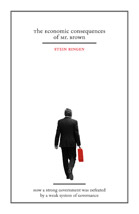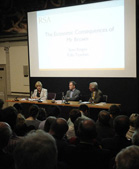 |
Stein Ringen discussed the conclusions of his book at a talk at the Royal Society of Arts with Polly Toynbee of the Guardian on 14th September 2009. The event was a great success and a sell-out.
Listen to Stein Ringen's talk here. |
The Economic Consequences of Mr. Brown NO LONGER AVAILABLE You can also purchase this title on Amazon. From 1997 to 2007, Britain had a government of exceptional strength. Its failures have nothing to do with the credit crunch that followed. By any ordinary political logic, this government should have succeeded in putting its mark on British life and society. In fact, its story is a tragic one. It tells how a government that had everything going for it, and that should have represented a break with the past, came to rule in a continuation of the discredited regime it had ousted. Under New Labour, Britain became an even more unequal society than when the Conservatives left office. Mr. Blair and Mr. Brown inherited Mrs. Thatcher's centralised government and then centralised further. Thereby they undermined their own cause and condemned themselves to ever harder effort for ever less gain. In spite of firm fiscal management and additional public spending and investment, the government has next to nothing to show for it in policy outcomes and nothing at all in turning the tide on Britain as a society of entrenched inequality. As Professor Ringen concludes: "This government of power was finally defeated by the system of governance it had to work through. Britain now has the most centralised system of government in Europe. All policies emanate and are run and managed from Whitehall, and preferably from Downing Street. Parliament, and notably the House of Commons, has virtually no role in the formulation of policy and very little role even in its scrutiny. Local government has been reduced to implementing commands from Whitehall. A structure of command has replaced the traditional partnership between ministers and top civil servants. The professions are not rallied and encouraged but subjected to a technocratic regime of rigid targets, performance indicators, league tables and the like." "The lesson of New Labour is that Britain needs, more than a new government, a new constitution".
|
| The Economic Consequences of Mr. Brown
|
Email: info@bardwell-press.co.uk Tel.: 01865 865 865 Fax: 01865 595 598


